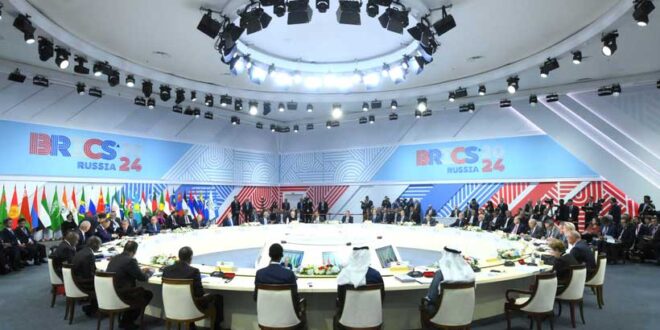The 16th BRICS Summit in Kazan, Russia, has arguably reshaped the narrative of global power dynamics, with the Kazan Declaration emerging as a resolute challenge to U.S.-dominated geopolitics. This pivotal document underscores a unified BRICS vision that opposes the misuse of global institutions for political leverage, advocates for de-dollarization, and pushes for a multipolar global order free from economic coercion. The summit solidified BRICS not merely as an economic coalition, but as a serious geopolitical alliance resisting unilateral sanctions and politicized diplomacy.
Washington’s Isolation Tactics Exposed
A key takeaway from the Kazan Declaration is the diminishing effectiveness of the U.S. in isolating Russia on the world stage. Despite extensive sanctions and pressures following the Ukraine conflict, Russia’s participation in BRICS, coupled with unyielding support from its member nations, signifies that efforts to marginalize Moscow have largely backfired. BRICS has shown a resounding willingness to stand against U.S.-led attempts to dominate global discourse and economically punish nations that dissent from its policies.
This resistance reflects a collective frustration with the use of punitive measures as a tool to enforce political conformity. Russia’s influence in BRICS not only underscores its resilience but also symbolizes a shift in how nations worldwide are resisting what they see as Western overreach.
The March Toward De-Dollarization
One of the most critical aspects of the Kazan Declaration is its commitment to de-dollarization, highlighting BRICS’ intention to diminish its reliance on the U.S. dollar in global trade and finance. As the dollar has been frequently weaponized in political disputes, the BRICS bloc’s exploration of alternative trade currencies represents a concerted effort to loosen U.S. economic control. With an expanding membership and a coalition that covers nearly half the world’s population, this financial paradigm shift could catalyze a transition away from dollar-dominated systems, reshaping international markets and limiting U.S. leverage in economic policy.
This shift is not merely a financial tactic but a political stance, aimed at creating an economic environment where nations can pursue independent policies free from the constraints of a dollar-dominated system.
An Alliance Against Sanctions and Hegemony
The Kazan Declaration highlights BRICS as an alliance against the hegemonic ambitions of sanctions regimes and coercive tactics often employed by Western nations. Many BRICS countries have endured economic penalties or interventions aimed at curbing their autonomy, and the declaration voices their collective desire for reform. Rather than perpetuating cycles of coercion, BRICS advocates for returning international organizations like the United Nations, World Bank, and IMF to their founding missions—promoting peace, development, and cooperation, rather than serving as platforms for political punishment.
The alliance calls for global institutions to be safeguarded against manipulation, advocating for equitable systems where nations are not marginalized or targeted for pursuing self-determined policies.
BRICS as a Voice for the “Victim Nations”
BRICS has become a natural hub for countries historically sidelined by Western powers. Prospective members such as Argentina, Iran, and other nations across Africa and Asia view BRICS as an avenue to escape U.S.-centric pressures. Many of these states have borne the brunt of foreign interventions, sanctions, or economic dependencies that BRICS now stands against. By presenting a multipolar vision, the Kazan Declaration asserts that BRICS is an alliance of the “victim nations,” united by their shared desire for a fairer global system.
Expansion as a Geopolitical Strategy
The potential expansion of BRICS may soon redefine the bloc as an alternative global power base, attracting countries from the Middle East, Latin America, and Africa. This broader coalition would encompass an enormous share of global resources, economies, and political sway, allowing it to reshape international trade and diplomacy.
BRICS was originally focused on fostering economic cooperation among emerging markets. However, U.S. foreign policies—seen by many as intrusive—have prompted a reorientation of BRICS’ mission. Today, the alliance stands as a counterbalance to U.S. influence, signaling a growing shift from economic cooperation to political alliance. This transformation is a direct response to global dissatisfaction with a perceived “unipolar” order, and as the bloc expands, BRICS may serve as a sanctuary for nations pursuing paths outside the U.S.-dominated framework.
The Strategic Roles of China and Russia
China and Russia, as BRICS’ most influential members, are instrumental in propelling the alliance toward a new world order. Together, they advocate de-dollarization, infrastructure initiatives, and expanded trade routes that bypass Western oversight. Initiatives like China’s Belt and Road and Russia’s energy diplomacy are redefining global trade and supply chains, presenting alternatives to dollar-based systems. Through these efforts, China and Russia aim to build a multipolar world order—one in which global governance is cooperative and balanced.
The future will see China and Russia playing a key role as co-navigators of a world order that is increasingly multipolar, with BRICS standing as the primary coalition for this transition.
Redefining Global Power
The Kazan Declaration signals a new era, one that rejects unilateral control in favor of cooperative governance. BRICS has moved beyond its origins as an economic bloc, transforming into a political alliance that opposes sanctions-based diplomacy and calls for a depoliticized global order. With expanding membership, BRICS is poised to become a powerful player in global politics, representing nations from a broad spectrum of cultures, economies, and ideologies.
In an age of shifting allegiances, the Kazan Declaration captures a world ready for change—a multipolar era where cooperation prevails over coercion, and where BRICS stands as a credible counterbalance to Western hegemony. With China and Russia at the helm, the alliance is uniquely positioned to lead this historic transformation.
 Geostrategic Media Political Commentary, Analysis, Security, Defense
Geostrategic Media Political Commentary, Analysis, Security, Defense





